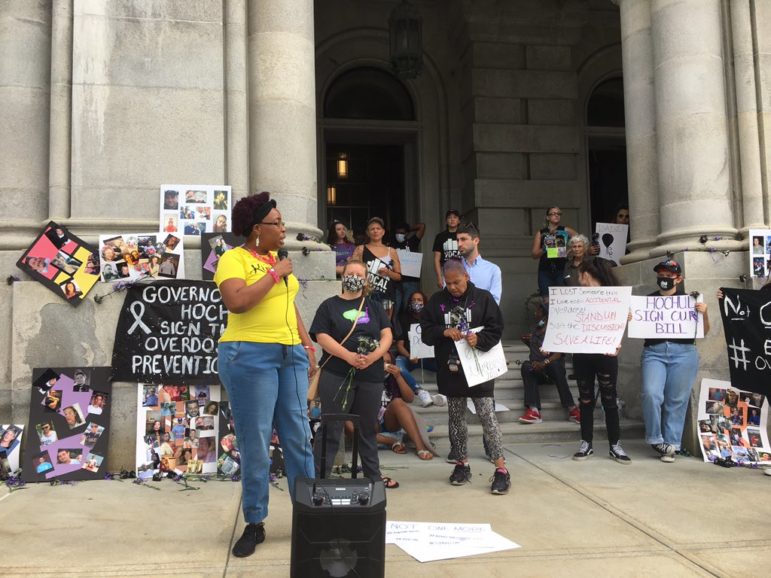The NYPD has made 1,483 arrests for syringe possession since 2006, with 17 people arrested so far this year for the offense, police department data shows. Advocates say the law is demonstrative of the “massive inconsistencies between the penal code and the health code.”

It’s been nearly two decades since New York authorized the state’s first syringe exchange programs, which provided intravenous drug users with access to sterile hypodermic needles—an effort to curb the spread of blood-borne diseases like HIV/AIDS and hepatitis B and C.
But it’s still illegal today for most people to possess a syringe in New York: Under the state’s Penal Law 220.45, criminal possession of a hypodermic instrument is a class A misdemeanor. The NYPD has made 1,483 such arrests since 2006, with 17 people arrested so far this year for the offense, police department data shows.
And while the law makes an exception for those in the state’s syringe exchange and access programs, who are given identification cards to prove they’re an approved participant, activists say those who are legally authorized to carry syringes are still sometimes penalized for it. For the last decade, health and justice advocates have been pushing for the state to decriminalize needle possession, saying it further stigmatizes people who use drugs and discourages them from engaging in the type of harm-reduction behaviors that experts say saves lives.
“For a long time, what it’s meant is that people with clean syringes on them are considered criminals,” Sen. Gustavo Rivera said on the floor of the State Senate in June, when the bill he sponsored to change the state law successfully passed both legislative chambers in Albany.
“We were finally able to get it through the Assembly and the Senate,” said Biz Berthy, drug policy campaign coordinator for the advocacy group Vocal-NY, who said the state syringe possession law demonstrates the “massive inconsistencies between the penal code and the health code.” Prior versions of the bill were introduced during each legislative session dating back to 2015, but never managed to pass.
And the latest version hasn’t become law yet, either: former Gov. Andrew Cuomo had not signed it before he resigned amid a sexual harassment scandal late last month. Now, advocates are calling on new Gov. Kathy Hochul to add her signature to Rivera’s bill, as well as two others related to overdose prevention which were passed by the legislature in its most recent session but haven’t been signed into law.
They are also pushing for her to authorize the state’s first Overdose Prevention Centers or safe injection sites, designated places where people can use intravenous drugs under medical supervision—what supporters say would help turn the tide in the state’s overdose crisis, fueled by the increasing prevalence of highly potent opioids like fentanyl.
Overdose deaths across the state of New York rose by nearly 37 percent in 2020 compared to 2019, according to data from the Centers for Disease Control and Prevention.
“She’s inheriting a really big crisis,” Berthy said of Hochul. “We’re just really hoping that she is a leader who leads with moral integrity.”
Vocal-NY held rallies on Tuesday to mark International Overdose Awareness Day, and to highlight the three overdose prevention bills they’re urging Hochul to sign. In addition to Rivera’s legislation to decriminalize syringe possession, the group is pushing for her signature on another bill that would require the state to launch a medication assisted treatment (MAT) program for people incarcerated in both state and county-run correctional facilities.
The third bill also deals with access to MAT, which uses medications like methadone and buprenorphine to treat and manage opioid addiction. It would do away with a state rule that requires patients with Medicaid, the public health insurance program for low-income people, get prior authorization from their insurer to access all forms of MAT, what advocates say creates an extra barrier for those seeking treatment.
“An insurance person basically gets to decide whether or not that person gets to receive coverage for that treatment,” Berthy explained. Cuomo vetoed a previous version of the bill during the 2020 legislative session, despite having signed another bill into law that removed the same prior authorization requirement for patients with private insurance.
Advocates for drug policy reform say they’re hopeful that Hochul will sign the legislation. During her first speech to the public as governor last week, she specifically mentioned the need to address the opioid crisis, mentioning its impact on her own late nephew.
Hochul’s reiterated those sentiments in a statement to City Limits.
“Combating the opioid epidemic is a top priority for Governor Hochul, having served as co-chair of the NYS Heroin and Opioid Task Force for years. She was also personally impacted by the crisis, losing a nephew to addiction several years ago,” a spokesperson said.
“Governor Hochul will continue to fight for protections for New Yorkers struggling with substance abuse in partnership with families and impacted groups. The Governor is reviewing the legislation and will have more to say on this soon.”









One thought on “Decade-Long Fight to Decriminalize Syringe Possession in NY Awaits New Gov’s Signature”
A needle exchange programs are safe, effective, cost-saving, and most importantly, they reduce the transmission of viral hepatitis, HIV and other infections. In addition, research shows that SEP’s and NEP’s do not increase illegal drug use or crime.